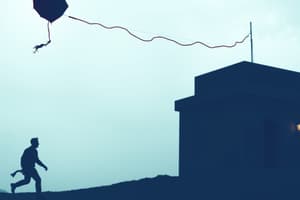Podcast
Questions and Answers
Who does Amir describe his relationship with as divided by ethnicity and religion?
Who does Amir describe his relationship with as divided by ethnicity and religion?
- Assef
- Baba
- Hassan (correct)
- Ali
What does the past do according to Amir's reflection?
What does the past do according to Amir's reflection?
Claws its way out.
What is the key theme reflected in the quote about a boy who won't stand up for himself?
What is the key theme reflected in the quote about a boy who won't stand up for himself?
Courage and self-assertion.
Amir believes he killed his mother.
Amir believes he killed his mother.
Amir aims to win the kite tournament to prove he is _____ to Baba.
Amir aims to win the kite tournament to prove he is _____ to Baba.
What phrase does Hassan say before he runs to find the fallen kite?
What phrase does Hassan say before he runs to find the fallen kite?
Study Notes
Quotes and Themes in "The Kite Runner"
-
Amir's and Hassan's Relationship:
- Ethnic and religious divides (Pashtun vs. Hazara, Sunni vs. Shi'a) impact friendship.
- Kites symbolize Amir's peaceful past in Afghanistan and contrasting betrayal connected to Hassan.
-
The Impact of the Past:
- Opening line highlights the struggle of confronting the past and its perpetual influence.
- Reference to Hassan's rape signifies a turning point and marks Amir's first major act of betrayal.
-
Father-Son Dynamics:
- Baba's perception of Amir as weak shapes Amir's insecurities.
- Baba’s disappointment and misunderstood expectations drive Amir to seek validation through competing.
-
Guilt and Redemption:
- Amir's complex relationship with Baba stems from feelings of inadequacy and guilt over his mother’s death during childbirth.
- Desire for redemption fuels Amir’s actions, including attempting to mirror Baba’s strength.
-
Kite Tournament Significance:
- Amir’s determination to win symbolizes his longing for approval and affection from Baba.
- The act of running the last kite embodies the quest for validation and represents Amir's childhood innocence.
-
Devotion and Betrayal:
- Hassan’s unwavering loyalty is displayed moments before an irrevocable betrayal occurs.
- This pivotal moment encapsulates the innocence of childhood contrasted with the forthcoming violence and betrayal.
-
Reflection on Sacrifice:
- The notion of sacrifice is explored, prompting considerations of what one is willing to endure for loyalty and friendship.
Recurring Motifs
- Kites: Represent joy, victory, betrayal, and Amir’s internal conflicts.
- Memory: The past's grip on the present is a central theme, highlighting the protagonist's difficulties in moving forward.
- Betrayal: Acts as a catalyst for personal transformation and moral dilemmas throughout the narrative.
Studying That Suits You
Use AI to generate personalized quizzes and flashcards to suit your learning preferences.
Description
Test your knowledge of memorable quotes from Khaled Hosseini's novel, 'The Kite Runner'. These flashcards focus on significant moments and themes from the book, enhancing your understanding of its characters and cultural context. Dive into the complex relationship dynamics and cultural nuances explored in the story.




